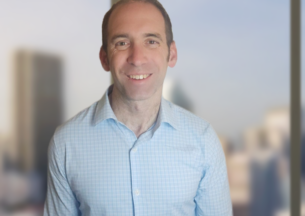David Cash Receives 2025 Quantrell Award for Undergraduate Teaching

The transformative education offered at the University of Chicago begins in the classroom, with the teachers who inspire, engage and inform their students.
UChicago annually recognizes faculty for their incredible teaching and mentoring of undergraduate and graduate students through the Llewellyn John and Harriet Manchester Quantrell Awards for Excellence in Undergraduate Teaching, believed to be the nation’s oldest prize for undergraduate teaching. This year, Professor David Cash received the award.
David Cash remembers the moment that changed his understanding of math completely. It was in an undergraduate course in discrete mathematics, he said, where he realized the field was more than a row of rote problems to solve over and over.
“Instead, these were problems where I would read two sentences and then walk around and think about it for the rest of the afternoon,” he said. “I learned how to sit with a problem and genuinely enjoy being stuck. I find it so joyful, and the peace and simplicity that comes with it compared to everything else in life.”
He loved it so much that this is now what he does for a living, as a mathematically oriented computer scientist—and now that he teaches his own discrete mathematics class, he tries to pass that fascination on to the students.

According to his students, it works. One wrote: “His genuine passion for the material was so contagious that now I intend on specializing in theoretical computer science.”
Cash tries to structure every class around a hook, whether it’s demonstrating the birthday paradox; how hackers exploit buggy code; unpacking how number theory underlies the encryption behind our everyday internet transactions; or exploring the story of the World War II Enigma code machine that was broken by Polish mathematicians.
But his enthusiasm is paired with a wholehearted willingness to work with anyone who’s struggling.
“Some of the best experiences for me happen when students struggle with the material a little bit, or even a lot. With a little help they usually wind up solving the problems themselves,” Cash said. “It’s really nice to see someone on day one who’s still learning the basic grammar of math, then solving pretty hard problems only a few weeks later.
“Being able to tell someone, ‘Oh, you actually seem to be really good at this,’ when they haven’t realized it for themselves—that’s such a privilege.”
This article was adapted by a previously published article from UChicago News.













